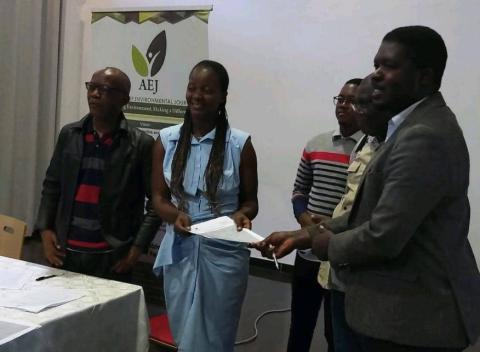The untold stories of Malawi's resilient female environmental journalists
Submitted by fkakooza on

In Malawi, female journalists are paving the way for impactful reporting on environmental issues despite facing numerous challenges. These dedicated women are undertaking the task of covering complex stories related to the environment while navigating obstacles that come with their gender in a traditionally male-dominated field.
Tionge Hara, a Chief reporter with AfricaBrief said that newsrooms are not fertile ground for female journalists compared to their male counterparts. The general perception is that investigative environmental stories are best executed by male journalists and so few females are given the opportunity to cover this beat.
"The journey is not that easy at all but l am always passionate about what I do," Hara observed. She explained that she relies on grants to support her work since newsrooms are unable to provide sufficient funds for her to cover these stories. Hara has so far received the Forest Accountability Journalism Initiative in Malawi grant twice, to help her cover in-depth stories.
“Kaning'ina forest under siege” is one of Hara’s stories. The story, which exposed the rampant deforestation of Kaning'ina forest, resulted in her receiving threats from authorities who were benefiting from the activities. https://africabrief.substack.com/p/everyones-fight-kaningina-forest read more of the story
“It is not a walkover… penetrating the authorities who are even influential in our respective newsrooms… News editors most of the times want to please the authorities in fear for their lives and jobs,” Hara ponders.
Dorothy Vanessa Kachitsa, the Customer Relations Executive at Global Internet Limited said that female journalists in Malawi are more interested in other niches, leaving a few on the environment beat.
"Environmental female journalists do face challenges like discrimination, sexual harassment, life threats and many others in Malawi, which scares away their interests to pursue environmental stories", notes Kachitsa. Unfortunately, their respective media houses do not pay attention to curbing the challenges.
Meanwhile, the Association for Women in Media (AWOME) in Malawi has more than 200 members yet only 15 of them are registered with the Association of Environmental Journalists in Malawi (AEJ). The AEJ was established in 2011 to fill the gaps in environmental science reporting. It aimed at increasing the frequency of good quality and credible environmental stories.
James Chavula, a photojournalist at National Publications Limited, said that environmental journalism in general poses great fears for one's life as both the media houses and the government have not met each other’s expectations. "I reported a story about the rampant deforestation which has fueled the dryness of the land and it gave a hard hit on me", said Chavula, adding that the population needs to be sensitized about the need for clean energy, in order to protect journalists from being harmed while in line of duty.
One of the primary obstacles female journalists encounter is the lack of access to certain areas or sources due to cultural norms or gender biases. In some communities, women are not granted the same level of trust or respect as their male counterparts, making it difficult for them to gather information or conduct interviews for their stories.
Furthermore, female journalists in Malawi often struggle with safety concerns while reporting on environmental issues. From navigating remote locations to dealing with potential backlash or threats, these women must constantly assess the risks involved in their work. Despite these challenges, many of them continue to persevere and bring attention to pressing environmental issues in the country.
Even with these obstacles, female journalists in Malawi are making significant strides in raising awareness about environmental challenges and advocating for positive change. Through their dedication and resilience, these women are not only breaking barriers in journalism but also driving conversations around sustainability and conservation in the country.
As the voices of female journalists in Malawi grow stronger, their impact on environmental reporting continues to be felt. Through their stories, these women are not only amplifying important issues but also inspiring future generations of journalists to follow in their footsteps and make a difference in the world of environmental journalism.
- 58 reads
